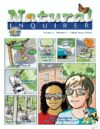Social Groupies: How Different Groups Use Urban Parks

People visit parks to do many different activities, such as play basketball, baseball, sunbathe, swim, walk, picnic, or go bicycling. If park managers know what people like to do in a particular park, they can do a better job of providing the opportunity. The question the scientist wanted to answer in this study was: What activities do people of different ethnic backgrounds do while visiting an urban park?

-
 In this FACTivity, you will use the findings from this research to design a picnic area.
In this FACTivity, you will use the findings from this research to design a picnic area.FACTivity – Social Groupies
In this FACTivity, you will use the findings from this research to design a picnic area. -
 Test your knowledge of social science and park design with a word search.
Test your knowledge of social science and park design with a word search.Word Search – Social Groupies
Test your knowledge of social science and park design with a word search.
Glossary
View All Glossary-

Paul Gobster
My favorite experience as a scientist is talking with people. As a social scientist who studies how people think about and use urban parks, I get to visit some very..."> View Profile
Note To Educators
The Forest Service's Mission
The Forest Service’s mission is to sustain the health, diversity, and productivity of the Nation’s forests and grasslands to meet the needs of present and future generations. For more than 100 years, our motto has been “caring for the land and serving people.” The Forest Service, an agency of the U.S. Department of Agriculture (USDA), recognizes its responsibility to be engaged in efforts to connect youth to nature and to promote the development of science-based conservation education programs and materials nationwide.

What Is the Natural Inquirer?
Natural Inquirer is a science education resource journal to be used by students in grade 6 and up. Natural Inquirer contains articles describing environmental and natural resource research conducted by Forest Service scientists and their cooperators. These scientific journal articles have been reformatted to meet the needs of middle school students. The articles are easy to understand, are aesthetically pleasing to the eye, contain glossaries, and include hands-on activities. The goal of Natural Inquirer is to stimulate critical reading and thinking about scientific inquiry and investigation while teaching about ecology, the natural environment, and natural resources.

-
Meet the Scientists
Introduces students to the scientists who did the research. This section may be used in a discussion about careers in science.
-
What Kinds of Scientist Did This Research?
Introduces students to the scientific disciplines of the scientists who conducted the research.
-
Thinking About Science
Introduces something new about the scientific process, such as a scientific habit of mind or procedures used in scientific studies.
-
Thinking About the Environment
Introduces the environmental topic being addressed in the research.
-
Introduction
Introduces the problem or question that the research addresses.
-
Method
Describes the method the scientists used to collect and analyze their data.
-
Findings & Discussion
Describes the results of the analysis. Addresses the findings and places them into the context of the original problem or question.
-
Reflection Section
Presents questions aimed at stimulating critical thinking about what has been read or predicting what might be presented in the next section. These questions are placed at the end of each of the main article sections.
-
Number Crunches
Presents an easy math problem related to the research.
-
Glossary
Defines potentially new scientific or other terms to students. The first occurrence of a glossary word is bold in the text.
-
Citation
Gives the original article citation with an internet link to the original article.
-
FACTivity
Presents a hands-on activity that emphasizes something presented in the article.
Science Education Standards
You will find a listing of education standards which are addressed by each article at the back of each publication and on our website.
We Welcome Feedback
-
Contact
Jessica Nickelsen
Forest Service -
Email




